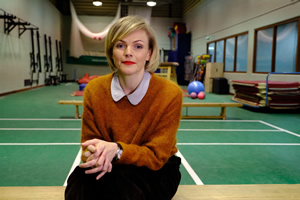
Maxine Peake
- Actor
Press clippings Page 5
Movies about comedy are rarely funny but Funny Cow takes the sad clown cliché to such a grim extreme it becomes almost laughable. Starring the excellent Maxine Peake as an aspiring British stand-up in the sexist, racist, homophobic environs of the Northern working men's clubs of the 1970s and early 1980s, the film around her is such a wilfully incoherent mess it renders her performance all but dead on arrival.
She plays the eponymous Funny Cow (no other character name is given), a battered wife who has apparently found success by transforming the trauma of her life into a stage act that mixes the sort of politically incorrect gags of the era with uncomfortable confessionals about her childhood, her marriage and her surroundings. Using what seems like a television special or a monologue-based theatre show as a framing device, the film deploys random flashbacks (with occasional magical realist flourishes) to various incidents in her life in order to track her evolution from defiant child who stood up to her violent father (Stephen Graham) to self-determining woman able to conquer the male-dominated club circuit with racist and fat-shaming jokes of her own.
Along the way she's mentored by a terminally depressed veteran comic (Alun Armstrong) and meets a cartoonishly conceived bookseller (a woefully miscast Paddy Considine), whose Pygmalion fantasies she's more than happy to exploit as she escapes her brutal marriage to the knuckle-dragging Bob (played by the film's writer Tony Pitts). Blink-and-you'll-miss-them cameos from the likes of Vic Reeves and John Bishop capture some of the sad, broken spirit of the variety circuit, but the film's determination to avoid the rise-fall-redemption character arc of the biopic (even a fictional biopic) backfires. By plotting a more elliptical and impressionistic course - one perhaps inspired by Nicholas Winding Refn's Bronson or the Andy Serkis-starring Ian Dury biopic Sex & Drugs & Rock & Roll - Funny Cow might give some sense of the chaos of its protagonist's life, but that's not the same thing as making it compelling on screen. In the end it feels like a hollow and rather pointless exercise.
Alistair Hawkness, The Scotsman, 20th April 2018Funny Cow review
Peake, as the mouthy, belligerent, ballsy Funny Cow, is always a joy to watch, while the jokes - distilled from contemporaneous acts - prove just how far comedy has come.
Veronica Lee, The Arts Desk, 19th April 2018Review - Funny Cow
Funny Cow will make you wondering if you are crying happy or sad tears by the end.
Jamie East, The Sun, 19th April 2018Review: Funny Cow
Maxine Peake captivates in a film that takes a serious look at being funny.
Emma Simmonds, The List, 16th April 2018Interview: Maxine Peake
"I do make a conscious effort not to try and play the same sort of character each time," she says, harking back to advice Victoria Wood gave her on dinnerladies.
The Scotsman, 15th April 2018Why is stand-up film Funny Cow not funny?
It is unfortunate that nothing Maxine Peake's stand-up comic says, either on or off stage, is remotely amusing.
Ryan Gibley, The New Statesman, 13th April 2018Interview: Maxine Peake
It's 1980s Blackpool and a young Maxine Peake and her dad are in a packed club on the front, watching a singer belting it out to a restless, day-trip audience. Not an easy crowd. Half way through the song someone bursts in and shouts "coach is 'ere!" The audience gets up and leaves, apart from Peake and her dad, who sit on, loving it.
Janet Christie, The Scotsman, 13th April 2018Funny Cow review
If you're expecting a comedic film, filled with laughs, you're in for a surprise! The film portrays what is frequently the comedic creative process of using your pain in order to create art and make others laugh. The title character goes through a great deal of hardship. You have been warned!
Mariana Feijó, Funny Women, 12th April 2018Creator Victoria Wood's summary of dinnerladies as "just a bunch of women who work in a canteen" belies how popular her first sitcom was. Twenty years after the show began, this three-parter tells the behind-the-scenes story, with contributions from the likes of Julie Walters, Maxine Peake and Jo Brand.
Ali Catterall, The Guardian, 14th March 2018Funny Cow review - Maxine Peake blazes
Peake is hypnotically belligerent as an ambitious club performer trampling over prejudice and sticky carpets on the 1970s comedy circuit.
Peter Bradshaw, The Guardian, 11th October 2017